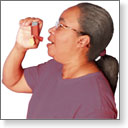| Asthma and aging |

When people think of asthma, they often associate it with children. But did you know that asthma is increasing among people over 65 years of age? Unfortunately, asthma cases among people over 65 often go undiagnosed, or misdiagnosed.
Recognizing Asthma
Unlike young people with asthma, whose main symptom is wheezing, seniors usually complain of a chronic cough. For this reason, asthma in older adults may be overlooked or misdiagnosed as the common cold or cough. Other symptoms may include wheezing, shortness of breath, fatigue, and weight loss.
Asthma in people over 65 often occurs among former smokers and those with emphysema, chronic bronchitis, or other conditions related to chronic obstructive pulmonary disease (COPD). Sometimes, it is hard to distinguish asthma from other conditions.
Triggers
Viral respiratory illnesses (e.g., influenza and the common cold virus) and tobacco smoke are the main triggers for adults with asthma. However, common asthma culprits such as dust mites, pet dander, pollen, and molds can also affect people over 65, especially those who spend a lot of time in the home. Lack of exercise or healthy foods may also contribute to poor lung health.
Treatment
Before you begin any asthma treatment plan, discuss with your doctor any other medications you are taking. Some asthma drugs have adverse side effects when mixed with other drugs. Your doctor may provide a written treatment plan that helps you keep track of your medications.
Steroid medicines, especially if taken by mouth, may contribute to cataracts and osteoporosis (thin bones). Always talk to your doctor about these side effects.
References
National Asthma Education and Prevention Program Expert Panel Report 3: Guidelines for the Diagnosis and Management of Asthma. Rockville, MD. National Heart, Lung, and Blood Institute, US Dept of Health and Human Services; 2007. NIH publications 08-4051.
Reviewed By: Allen J. Blaivas, DO, Clinical Assistant Professor of Medicine UMDNJ-NJMS, Attending Physician in the Division of Pulmonary, Critical Care, and Sleep Medicine, Department of Veteran Affairs, VA New Jersey Health Care System, East Orange, NJ. Review provided by VeriMed Healthcare Network. Previoulsy reviewed by David A. Kaufman, MD, Section Chief, Pulmonary, Critical Care & Sleep Medicine, Bridgeport Hospital-Yale New Haven Health System, and Assistant Clinical Professor, Yale University School of Medicine, New Haven, CT. Review provided by VeriMed Healthcare Network. (6/1/2010)
